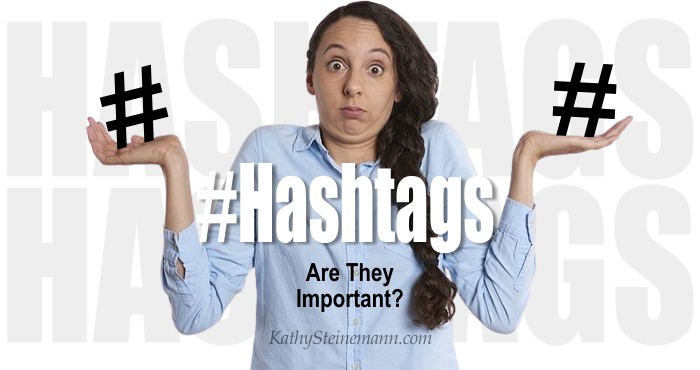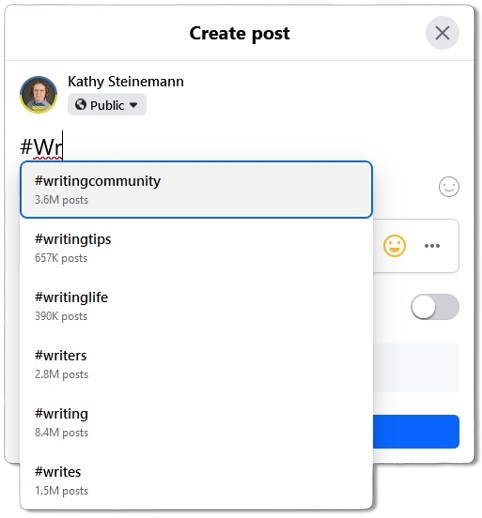
Hashtags Are More Than Crosshatches and Words
Yes, they guide social media users.
But are you aware that they also guide search engines? Read on for more information.
Not Sure What Hashtags Are?
Let’s look at a typical string of hashtags you might see in a social media post:
#Writers #Authors #Writing #WritingCommunity
This sequence of words and # symbols tells people that the post should interest writers and authors. It’s about writing, and belongs with other posts in the writing community.
Note that capitalization makes hashtags easier to read at a glance, especially multi-word hashtags. This is an important consideration for sight-impaired readers.
The Dictionary Definition
Oxford Languages, which provides Google’s definitions for English words, defines the noun hashtag as follows:
a word or phrase preceded by a hash sign (#), used on social media sites and applications, especially Twitter, to identify digital content on a specific topic.
“spammers often broadcast tweets with popular hashtags even if the tweet has nothing to do with them”
Oops! The definition is a bit out of date. I expect Oxford to replace Twitter with X someday soon.
How Do Hashtags Work?
If you see a social media post with the #Writers tag, you’ll notice that it’s a clickable link. If you click on it, you’ll find other posts of interest to writers — assuming that the people who set up the posts were careful with their selection of tags.
If you’re interested in trending news, entertainment, a specific celebrity, etc., search by typing appropriate hashtags, and your social media feed will target results to find what you’re looking for.
Remember the definition, though, and its mention of spammers. Don’t include #Trump just because Trump is always on the news. Your followers won’t appreciate your dishonesty.
So What?
Let’s assume you’ve created a post about writing, but it doesn’t include specific words you deem important for that post. Including the words might seem like too much exposition or condescension, and could detract from your main point. You can include hashtags in the post’s description that search engines see. Sometimes a hashtag or two in the page’s title might even be appropriate.
The Writer’s Lexicon series
and additional resources on my Facebook page.
Please: No Numbers or Special Characters in Your Tags
#Art4TheGalaxy might look appealing, but someone who hears it, possibly in a commercial or when talking to another person, would expect #ArtForTheGalaxy. Let’s compare them side by side:
#Art4TheGalaxy #ArtForTheGalaxy
Most people would find the second version easier to read.
Ditto for underscores and other special characters. Stick to letters, and use numbers only when they function as numbers.
Speaking of numbers: Some sources indicate that hashtags containing digits don’t always work.
But Don’t Overdo the Tags
Which of the following page titles is easier to read?
How to Use #Hashtags in a #Page #Title on Your #Website
How to Use #Hashtags in a Page Title on Your Website
The most important word, Hashtags, stands out in the second example, and the title is more pleasing to the eye. Both titles fall within the 60-character limit recommended by SEO experts.
Do Search Engines Pay More Attention to Hashtags?
Some sources respond with a resounding yes! Others disagree. Search algorithms are proprietary, so it’s unlikely to find a definitive answer.
However, it can’t hurt to use every tool available to you.
Deploy hashtags wisely, always considering their visual impact on your audience.
Some Social Media Sites Offer Help
I’ll use Facebook to explain.
Most of my articles are about writing. What happens if I need writing-related hashtags for an article?
Facebook knows me pretty well. I barely start with #Wr, and the following suggestions come up.

Facebook presents everything in lower case, but each example shows a hashtag followed by the number of posts that include it. Don’t let the lack of capitalization throw you. Social media doesn’t differentiate between upper and lower case the way the human eye does.
For example, #WritingCommunity has 3.6M posts, but #WritingLife has only 390K. Which will grab you the most coverage? Oh, wait a second. #Writing has 8.4M posts. Maybe it’s the best hashtag for the article.
You can expect similar results in other social media applications. Exercise your judgment and choose what is most appropriate for you.
The Writer’s Lexicon series
and additional resources on my Facebook page.
Discover more from KathySteinemann.com: Free Resources for Writers
Subscribe to get the latest posts sent to your email.

# Authors:
Pay attention to Kathy Steinemann for great tips on writing and marketing.
Hey, thanks, Jay!
When adding hashtags tp a post or whatever, is it advisable to separate them with commas? I’ve heard somewhere this is the case. And what about spaces between tags?
Spaces yes, commas no.
Yes: #Hashtags #Internet #SocialMedia
No: #Hashtags, #Internet, #SocialMedia
No: #hashtags #internet #social media
As soon as you break a hashtag into more than one word, the hashtag becomes the first word, and the rest of the phrase no longer belongs to the tag. Thinking about hashtags I’ve seen over the years, I don’t remember ever seeing commas separating them.
Thanks for mentioning this, Thomas!
I just went and checked my memory: I’ve never seen a hastag on a FB post.
If I have something I’d like the search engines to pick up, how and where would I put a hashtag on one of my FB posts?
I follow several blogs – I don’t see hashtags on any of the writing blogs. So how and where?
The keywords I choose myself at the end of my posts?
If few people use a tag, does that make the post be more seen by readers – or less?
Thanks.
Hi Alicia.
Go to Facebook and enter “#writing” in the search bar. Facebook will respond with a page of writing-related posts. Ditto for other hashtags. People generally keep the tags low on a post, so you might not see them unless you click on “See more” — but they’re there.
You can use them in titles, keywords, at the end of a blog post, or in the area reserved for “Meta Description” (nothing to do with the Facebook parent company) and/or social media description. Your options for a page’s description will depend on your blogging platform and plugins. The key is to keep your hashtags in non-intrusive areas so that readers aren’t annoyed by their presence.
Savvy readers will be able to find a post faster on social media and in search engines if its tags are focused on the page’s content.
I’m dreadful at forgetting to use hashtags. Thank you for this reminder.
I agree that too many hashtags is off putting. I have been known to ignore a post because there are so many hashtags.
I’m with you on too many hashtags, Vivienne. When posting, I keep most of my hashtags near the bottom of each post in a separate line after the link, if there is one. It’s #definitesolutely #tough to #read #text #littered with #tags.
Half the tags in the previous sentence were useless. That’s a problem with many of the tags on social media. Unless they’re common tags, they provide zero benefit.
Enjoy the rest of your day!
I have been reading your valued words for quite a while now…Am a ‘surprised’ nonagenarian but still writing…My stint as a columnist lasted seven years but, sadly, the local newspaper: The Costa Banca News, shuts shop this coming Friday. I shall miss it. I’ve had nine books published but still considering busking…My 10th awaits a publisher (I’m as good as a doughnut with technology.) The very best of good luck with your work and ‘thank you.’
Thanks, Joy. I’ve seen your posts on social media for years and have always admired your determination.
Another newspaper shuts down. Sad. Local news, especially, is dying a painful death. The internet and television will never take the place of local reporters.
Busking? I know someone in her seventies who busks, and she enjoys every second of it.
Good luck with your music and books!